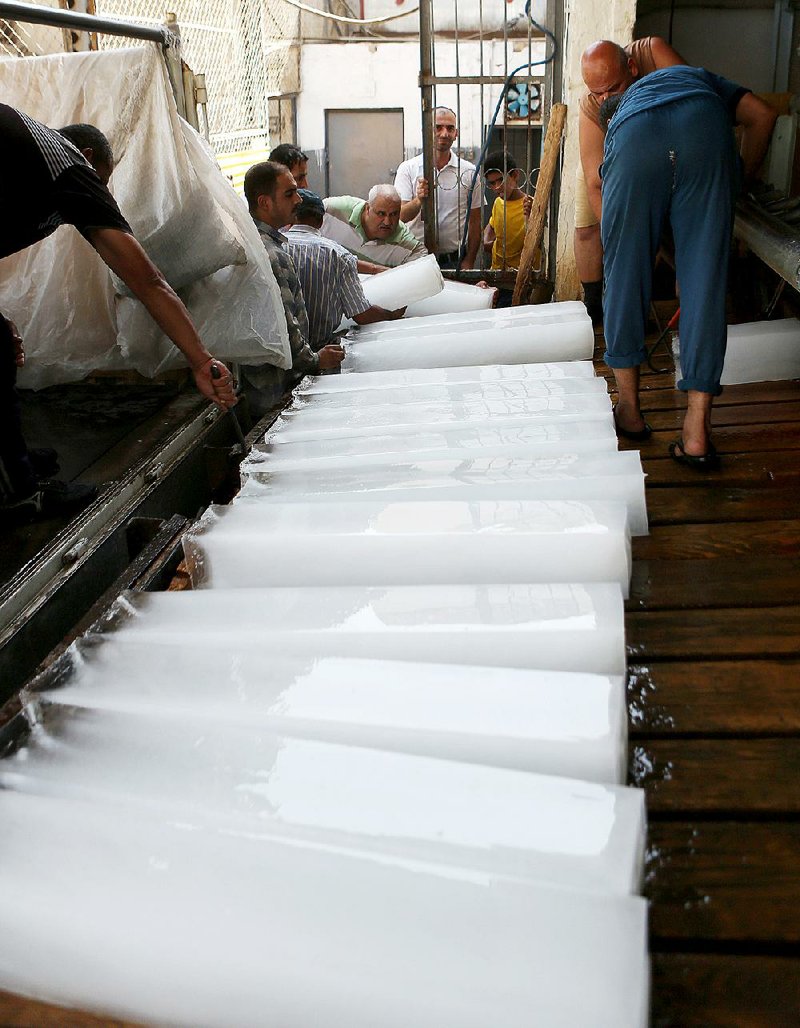BAGHDAD -- It's a 15-minute walk through a lush palm grove from Baghdad's al-Takia refugee camp to the nearest well, but as temperatures hovered about 126 degrees Fahrenheit on Thursday, Zakiyah Abdullah, who is eight months pregnant, said it felt like an eternity.
Soaring temperatures are normal this time of year, but an unprecedented heat wave prompted Iraqi authorities to declare a mandatory four-day holiday beginning Thursday.
The government has urged residents to stay out of the sun and drink plenty of water, but for Abdullah and many of the more than 3 million Iraqis displaced by conflict, that poses a dilemma.
Abdullah, her face sunburned, said she is nauseous from the heat and worried about the baby's health. So with sons Omar, 3, and Abdulkader, 7, in tow, she ventured to the well, walking slowly and taking deep breaths.
When they reached the well, Abdulkader squatted down with his white bucket to collect the water -- but nothing came out.
"Turn it on!" Omar screeched.
"It is on! It's not working!" Abdulkader replied.
Chronic electricity and water cuts in Iraq and other conflict-ridden countries make heat waves even more unbearable -- particularly for the more than 14 million people displaced by violence across the region. In the southern Iraqi city of Basra earlier this month, protesters clashed with police as they demonstrated for better power services, leaving one person dead.
Unlike other countries in the region, Iraq lacks beaches, and travel restrictions make it difficult for people to escape the sweltering heat, leaving many -- even those fortunate enough to live in their own homes -- with limited options for cooling off. Some swim in rivers and irrigation canals, while others spend these days in air-conditioned shopping malls.
To the south, in the similarly sweltering Persian Gulf, residents cranked up their air conditioners, and elsewhere in the Middle East, those who could headed to the beach to escape Thursday's soaring temperatures, high even by the standards of the region.
It is not uncommon for well-off Persian Gulf residents to decamp with their luxury cars and servants to cooler spots such as the United Kingdom or Switzerland as temperatures rise. Saudi Arabia's King Salman, joined by a delegation numbering in the hundreds, is currently cooling off in the south of France.
Several Persian Gulf states, including the United Arab Emirates, Qatar and Saudi Arabia, mandate midday breaks when temperatures are at their highest for low-paid migrant laborers during the summer months. But that only provides some relief, as many still spend long hours working in the heat and travel to job sites on buses without air conditioning.
A Filipino rights activist collapsed and later died of apparent heatstroke during a visit to his country's consulate in Dubai this week.
One of the hottest spots in the Gulf was Kuwait City, where Thursday temperatures were expected to reach 118 F. The civil-aviation authority's meteorological department forecast daytime conditions as "very hot" and overnight temperatures as "relatively hot," with moderate winds providing little relief.
Kuwaitis took it in stride.
"Honestly, everyone has adapted to the heat. Most activities are only indoors and air-conditioned," said Fajer al-Matrouk, 25, who works in marketing. "Life goes on despite the insane heat."
Nazem al-Ghabra, 31, who works in corporate communications, agreed.
"We're used to this weather, and Kuwait is well-equipped for this harsh weather as almost everything is indoors, even car parking," he said.
For some Iraqis, heat waves mean big business. Ahmed Abu Ali sells power generators and fans, precious commodities this time of year. With rampant power cuts, his generators, which sell anywhere from $200 to $800, are flying off the shelves.
"People try to get by without them but in temperatures like this and constant power cuts, they come running to buy them," he said. "I will keep selling generators for the next few months until November, when it gets cold, and then I'll start selling heaters. I'm a businessman after all."
Information for this article was contributed by Hussain al-Qatari and Adam Schreck of The Associated Press.
A Section on 07/31/2015
